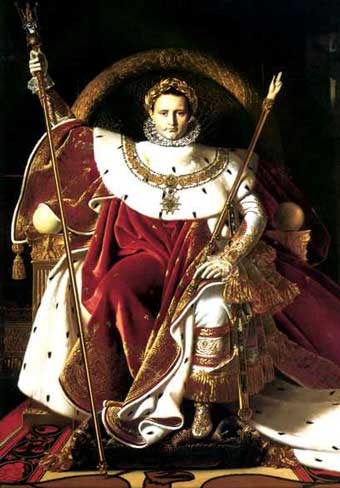Mystery of Napoleon's Death Said Solved

Sara Goudarzi
LiveScience Staff Writer
Wednesday, January 17, 2007
Putting to rest a 200-year-old mystery, scientists say Napoleon Bonaparte died from an advanced case of gastric cancer and not arsenic poisoning as some had speculated.
After being defeated by the British in 1815, the French Emperor was exiled to St. Helena--an island in the South Atlantic Ocean. Six years later, at the age of 52, Bonaparte whispered his last words, "Head of Army!"
An autopsy at the time determined that stomach cancer was the cause of his death. But some arsenic found in 1961 in the ruler's hair sparked rumors of poisoning. Had Napoleon escaped exile, he could have changed the balance of power in Europe; therefore murder speculations didn't seem outlandish.
However, a new study--combining current medical knowledge, autopsy reports, Bonaparte's physician memoirs, eyewitness accounts, and family medical histories--found that gastrointestinal bleeding was the immediate cause of death.
"This analysis suggests that, even if the emperor had been released or escaped from the island, his terminal condition would have prevented him from playing a further major role in the theater of European history," said lead study author, Robert Genta of University of Texas Southwestern. "Even today, with the availability of sophisticated surgical techniques and chemotherapies, patients with gastric cancer as advanced as Napoleon's have a poor prognosis."
A four-inch lesion
The original autopsy descriptions indicated that Bonaparte's stomach had two ulcerated lesions: a large one on the stomach and a smaller one that had pierced through the stomach wall and reached the liver.
Genta and his colleagues compared the description of these lesions with current images of 50 benign ulcers and 50 gastric cancers and found that the emperor's lesions were cancerous.
"It was a huge mass from the entrance of his stomach to the exit. It was at least 10 centimeters [4 inches] long." Genta said. "Size alone suggests the lesion was cancer."
A severe case
Bonaparte, the researchers said, had a very severe case of the cancer which had spread to other organs.
"Even if treated today, he'd have been dead within a year," Genta said.
Although the emperor's father also died from stomach cancer, Bonaparte's cancer most likely stemmed from an ulcer-causing bacterial infection, the researchers said.�
A diet full of salt-preserved foods but sparse in fruits and vegetables--common fare for long military campaigns--increased Napoleon's risk for gastric cancer, Genta said.
The study is detailed in the January edition of Nature Clinical Practice Gastroenterology & Hepatology.
http://michellemoran.blogspot.com/

